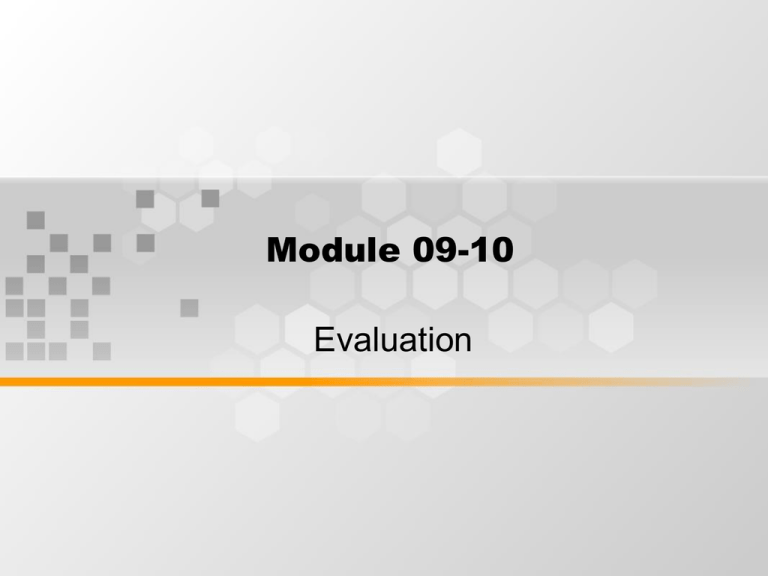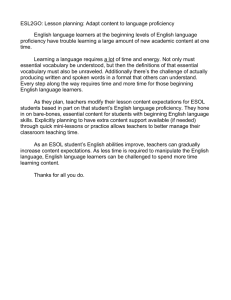Module 09-10 Evaluation
advertisement

Module 09-10 Evaluation What’s Inside 1. Placement Test 2. Achievement Test 3. Proficiency Test Placement Test To determine the learner’s state of knowledge before the ESP course begins Any placement test can only be an approximate guide and should be treated with due caution. • The good placement test should also reveal positive factors. It should show not just what the learner lacks, but also what potential for learning can be exploited in the ESP course. Achievements Tests An ideal achievement test should cover: 1. Involves production as well as understanding. 2. It is an integrated task rather than a set of discrete point focusing on particular sub-skills. 3. the content is of similar nature to that of the unit is concerned. 4. The subject matter is probably already known to the learners. 5. It does not require knowledge of subjectspecific vocabulary 6. It tests written production Proficiency tests Proficiency tests for specific purposes should be able to give reliable indication of whether a candidate proficient enough to carry out the tasks that will be required. Module 10 Evaluation • What’s Inside 1. What is evaluation? 2. What do we evaluate? 3. Collecting data for need analysis and evaluation process 4. Analysing learning needs Key stages : evaluation needs analysis Assessment course design teaching - learning Key stages : evaluation needs analysis Assessment course design teaching - learning Things to consider: 1. 2. 3. 4. Know what we did not know Not waste our clients’ or students’ time Appear much more professional Know how we should analyze the data What is meant by needs? – Objective and subjective – Perceived and felt – Target situation/goal-oriented and learning – Process-oriented and product-oriented – Necessities, wants and lacks (Brindley et.al) Needs are based on: • Target situation analysis (TSA) • Learning situation analysis (LSA) • Present situation analysis (PSA) What needs analysis establishes personal information about learners Language information about target situation Professional information about learners Environmental Situation How to communicate in the target situation Language learning needs Learner’s lacks Learners’ needs from course Module 11 Evaluation What’s Inside 1. What is evaluation? 2. What do we evaluate? 3. Collecting data for need analysis and evaluation process 4. Analysing learning needs A current concept of needs analysis Needs analysis including aspects of all these approaches: a. Professional information about the learners. b. Factors which may affect the way they learn. c. English language information about the learners. d. The learner’s lacks e. Language learning information] f. Professional communication information about: knowledge of how language and skills are used in the target situation. g. What is wanted from the course h. Information about the environment in which the course will be run. Matching needs analysis to situation long, extensive, repeated long, extensive, one-off short, intensive, repeated Short, intensive, one-off Evaluation Evaluation is asking questions and acting on the responses “Evaluation is a whole process which begins with determining what information to gather and ends with bringing about change in current activities or influencing future ones.” What do we evaluate? Audience and purpose • Who are the stakeholders? • What do you want to evaluate? • What do you want to change? Criteria for Evaluation • What are the objectives you are evaluating against? • What will you do with the answers? • What can you change? • What requires the authority of others? • What will convince them? Who collects the data? - Outsiders - Insiders Who Provides the data?


